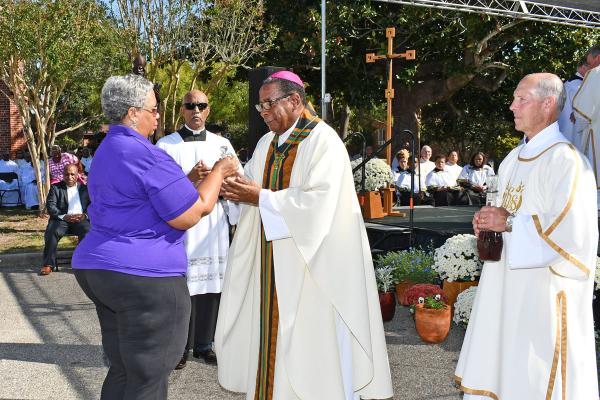
BAY ST. LOUIS, Miss. — The first four African Americans to be ordained Catholic priests at St. Augustine Seminary in Mississippi in 1934 "stood tall in the midst of segregated times," said retired Bishop J. Terry Steib of Memphis.
"They were the men who stood tall, who served the Lord in some trying times. These are men who are role models for us," the bishop said at a recent Mass celebrated to mark the centennial of the founding of the first seminary in the U.S. to train Black men for the priesthood.
Located in the Diocese of Biloxi, it was originally established by the Society of the Divine Word, also known as Divine Word Missionaries, as the Sacred Heart Preparatory Seminary in 1920 in the Mississippi Delta city of Greenville. The seminary moved three years later to Bay St. Louis, which is on the Gulf of Mexico between New Orleans and Biloxi.
On May 23, 1934, the first four men ordained to the priesthood at St. Augustine were Anthony Bourges, Maurice Rousseve, Francis Wade and Vincent Smith.
Between its inception and closure in 1968, the seminary produced numerous priests, nine of whom later became bishops, including Bishop Steib, who was the principal celebrant of the special centennial Mass Oct. 29 on the grounds of the seminary, which now serves as a retreat center for the southern province of the Divine Word Missionaries.
"One hundred years ago on Sept. 16, 1923, the House Chronicle of St. Augustine Seminary described the formal opening day of the seminary as a 'red-letter day in the annals of St. Augustine Mission House in Bay St. Louis, Mississippi,'" said Bishop Steib, who headed the Memphis Diocese from 1993 until his retirement in 2016.
"It was the day of dedication of this new mission house and, in the history of the Catholic Church among the Colored people of America, the day of the of the opening of the portals of the first seminary for young men of their race with a vocation to the priesthood, a day that will be long remembered as an epoch-making forward step," he continued.
"Now, one hundred years later, today is another red-letter day because we are celebrating the centennial year of this seminary, 100 years of preparing young Black men for the priesthood right here at St. Augustine. It is indeed and has been an epoch-making time. We celebrate and we praise God for this epoch-making time," the bishop said.
Concelebrating the Mass with Bishop Steib were Archbishops Thomas J. Rodi of Mobile, Ala, Gregory M. Aymond of New Orleans and Shelton J. Fabre of Louisville, Ky.; as well as Bishops Louis F. Kihneman III of Biloxi, Michael G. Duca of Baton Rouge, La., Bishop J. Douglas Deshotel of Lafayette, La., Bishop Anthony B. Taylor of Little Rock, and Curtis J. Guillory, retired bishop of Beaumont, Texas.
Like Bishop Steib, Bishop Guillory is one of the priests formed by St. Augustine Seminary who became a bishop.
"We give thanks for the St. Augustine Seminary, a building that stood majestically and tall for over 75 years, a building where high school seminarians lived and studied, where African-American students were trained and formed as they discerned a call to be priests and Divine Word Missionaries, despite the odds," Bishop Steib said at the Mass.
Bishop Steib imagined that, if the minor seminary building were still standing erect and could speak, it would mention how proudly the hundreds of alumni who graduated from the school moved on.
He also said it would recall those students who did not complete their high school years there, "but were able nonetheless to move into their respective careers and vocations in life as administrators, as principals and teachers, as lawyers and judges, as guidance counselors, as religious men, as family men, as leaders in the political world and the business world and made our world a better world, a holier world, just because they had been here, despite all the odds."
Please read our Comments Policy before posting.
Article comments powered by Disqus Diocese welcomes larger seminarian class
Diocese welcomes larger seminarian class
 Catholic seminarians accompany patients at hospital
Catholic seminarians accompany patients at hospital
 Preparatory year added to diocesan seminary formation
Preparatory year added to diocesan seminary formation
 Priesthood studies up next for Catholic High seniors
Priesthood studies up next for Catholic High seniors
 Ashburn battled with faith before committing to priesthood
Ashburn battled with faith before committing to priesthood
 Don’t let misconceptions cause faith to waver
Don’t let misconceptions cause faith to waver
 Seniors, whatever storms may come, Jesus will be there
Seniors, whatever storms may come, Jesus will be there
 Studio 3:16 offers new approach to teaching religion
Studio 3:16 offers new approach to teaching religion
 After three decades, NLR principal plans to retire
After three decades, NLR principal plans to retire
 CHS athlete overcomes odds to reach collegiate goal
CHS athlete overcomes odds to reach collegiate goal
 St. Joseph a model of solidarity with immigrants
St. Joseph a model of solidarity with immigrants
 Two gifts after Jesus’ death: Virgin Mary and Eucharist
Two gifts after Jesus’ death: Virgin Mary and Eucharist
 Why we have an altar, and not just a communion table
Why we have an altar, and not just a communion table
 Pope: Wars should be resolved through nonviolence
Pope: Wars should be resolved through nonviolence
 Living relationship with Jesus Christ in the Eucharist
Living relationship with Jesus Christ in the Eucharist